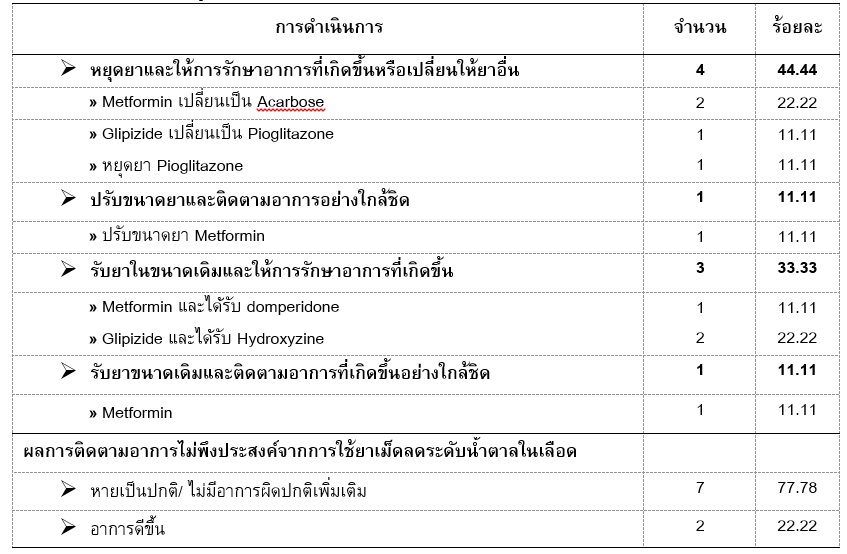Development of Program to Support Self-Care Behavior for Blood Sugar Control among Type 2 Diabetes Mellitus Patients
Keywords:
Program, Self-care behaviors, Blood Sugar Control, Type 2 Diabetes MellitusAbstract
This study aimed to develop a program for blood sugar control in Type 2 Diabetes Mellitus (DM) patients who received their medications at Angthong Hospital 2. A multidisciplinary healthcare team developed group activity programs designed to counsel patients about self-care behaviors to control blood sugar. Patients’ clinical outcomes and behaviors were evaluated at 3 months after program initiation. Data were collected from 65 uncontrolled Type 2 DM patients between January and March 2019. After program initiation, significant improvement in mean behavior scores were observed in food intake (before 1.94±0.23 vs. after 2.87±0.20), exercise (before 1.96±0.27 vs. after 2.91±0.21), and medication intake (before 2.03±0.19 vs. after 2.94±0.13) (all p-value < 0.001). Significant reductions in mean HbA1C (before 7.42±0.27% vs. after 6.49±0.37%) and mean Fasting Blood Glucose (FBG before 165.55±0.25 mg/dl vs. after 115.98±0.15mg/dl) were also found (all p-value < 0.001). Medication use was monitored for all patients. More than 80% of patients showed up at each follow-up visit. This study demonstrates that the program developed here for blood sugar control successfully supported patients in improving self-care health behaviors which yielded better control of blood glucose in their therapeutic goals.
References
World Health Organization. Noncommunicable disease country profiles. Geneva: WHO Document Production Services; 2014.
Ministry of Public Health. Thailand healthy lifestyle strategic plan 2011-2020. 4th ed. Nonthaburi: Thailand Healthy Stretegic Management Office; 2012.
The Twelfth National Health Development Plan Steering Committee, Ministry of Public Health. The Twelfth National Health Development Plan (2017-2021). Nonthaburi: Ministry of Public Health; 2016.
Wichai Aekplakorn. Thai National Health Examination Survey, NHES V (2014). Nonthaburi: Health Systems Research Institute; 2016.
Suwattanakul T. Factors related to blood sugar control among diabetes mellitus type 2 patients. Journal of Health Systems Research 2018: 12(3); 515-522.
Munkhong K, Kimsungnoen N, and Namvongprom A. Comparison of health promoting behaviors of controlled and uncontrolled type 2 diabetic patients. Journal of the Royal Thai Army Nurses 2016: 17(3); 54-62.
Hayeepachi N and Pouyfung P. Effective factors associated with controlling blood sugar among diabetes mellitus type 2 patients on follow-up at medical division, Chiang Rai Municipality.Nursing Public Health and Education Journal 2019: 20(3); 83-94.
Inspection and Grievances Division, Ministry of Public Health. Reports of Provincial Inspection in the Fiscal Year 2018 [Internet]. Ang Thong; 2018 [Cited 17 Dec 2018]. Accessed from: http://bie.moph.go.th/e-insreport/file_province. php?id=4&around=2&prov_id=71 &year=2561.
Angthong Hospital. Diagnosis-Related Groups Reports of Outpatients receiving medical service at Angthhong Hospital 2 [2018]. [Angthong]: Angthong Hospital; 2018.
Srisa-ard B. Preliminary Research, 5th ed. Bangkok: Suveeriyasas; 2010.
Diabetes Association of Thailand under the Patronage of Her Royal Highness Princess Maha Chakri Sirindhorn, The Endocrine Society of Thailand, Department of Medical Service, Ministry of Public Health, National Health Security Office. Clinical practice guideline for Diabetes 2017. Pathum Thani: Romyen Media; 2017.
Siangdung S. The Southern College Network Journal of Nursing and Public Health SCNJ.2017; 4(1):191-204.
Riangkam C, Wattanakitkrileart D, Ketcham A and Sriwijitkamol A. Health Literacy, Self-Efficacy, Age and Visual Acuity Predicting on Self-Care Behaviors in Patients with Type 2 Diabetes. J Nurs Sci. 2016; 34(4): 35-46.
Health Product Vigilance Center. Health Product Adverse Event Report Form [Internet]. Nonthaburi; 2018 [Cited 17 Dec 2018]. Accessed from. http://thaihpvc.fda.moph.go.th/thaihvc/Public/NewsFiles/uploads/hpvc_20_20 _0_100997_1.pdf.
Srisatitnarakul B. The methodolody in nursing research. 5th ed. Bangkok: UandI intermedia; 2010.
Aumbangtalad D, Prasogwatthana S. Effectiveness of intensive care program for patients with type II diabetes on knowledge, self-management behavior and blood glucose levels of diabetic patients in the PCU, Bang Pa-In District, Pra Nakhon Si Ayutthaya Province. Nursing Public Health and Education Journal. 2017; 18(1): 11-23.
Chongchareon W, Kahawong W, Apichato A, Sangchandr O, Chukumneard P, Boonsin K, Chugnan T. A self-care promotion model for controlling blood sugar in type 2 diabetes. Songkla Med J. 2008; 26(1):71-84.
Kaweekorn P, Prasomruk P. A Model Development of Self- Care behavior for blood sugar control among Type 2 Diabetic patients in Loengnoktha Crown Prince Hospital. Community Health Development Quarterly Khon Kaen University. 2016; 4(3): 307-24.
Sadakorn S, Saengcharoen W, Wongpoowarak P, Lerkiatbundit S. Clinical Impact of Pharmacist Counseling on Type 2 Diabetes Patients. Isan J Pharm Sci. 2014; 9 (Supplement): 116-21.
Muangkum A, Suttajit S. Effects of Patient Empowerment on Self-efficacy, Adherence and Glycemic Control in Patients with Type 2 Diabetes. Thai Pharm Health Sci J. 2013; 8(3): 104-11.
Pongpumma L and Himananto S. Knowledge and self care behavior among type 2 diabetes living in Bangsai, Maung, Chonburi, Chonburi Province. HCU Journal of Health Science 2017: 20(40);

Downloads
Published
How to Cite
Issue
Section
License
Copyright (c) 2020 Naresuan Phayao Journal

This work is licensed under a Creative Commons Attribution-NonCommercial-NoDerivatives 4.0 International License.
ผู้นิพนธ์ต้องรับผิดชอบข้อความในบทนิพนธ์ของตน มหาวิทยาลัยพะเยาไม่จำเป็นต้องเห็นด้วยกับบทความที่ตีพิมพ์เสมอไป ผู้สนใจสามารถคัดลอก และนำไปใช้ได้ แต่จะต้องขออนุมัติเจ้าของ และได้รับการอนุมัติเป็นลายลักษณ์อักษรก่อน พร้อมกับมีการอ้างอิงและกล่าวคำขอบคุณให้ถูกต้องด้วย
The authors are themselves responsible for their contents. Signed articles may not always reflect the opinion of University of Phayao. The articles can be reproduced and reprinted, provided that permission is given by the authors and acknowledgement must be given.







